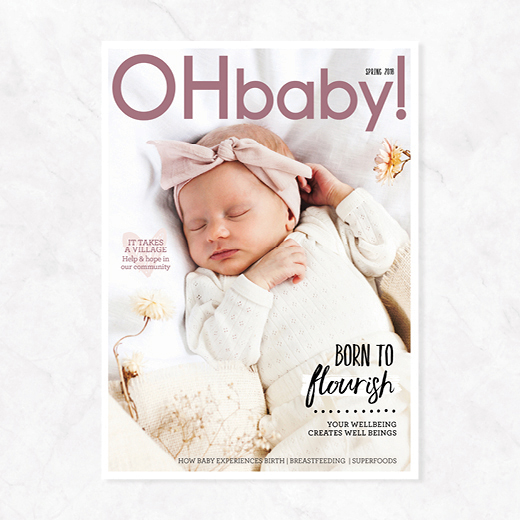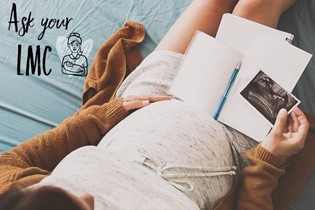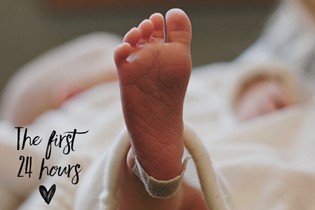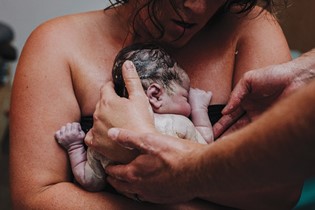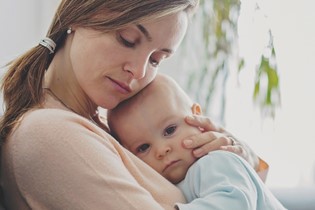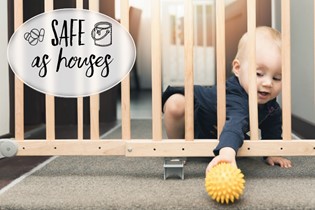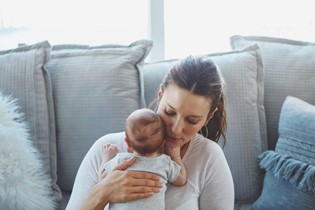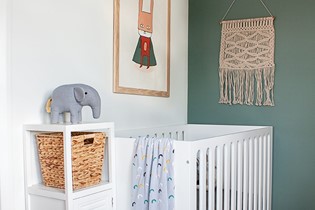How to overcome perinatal depression
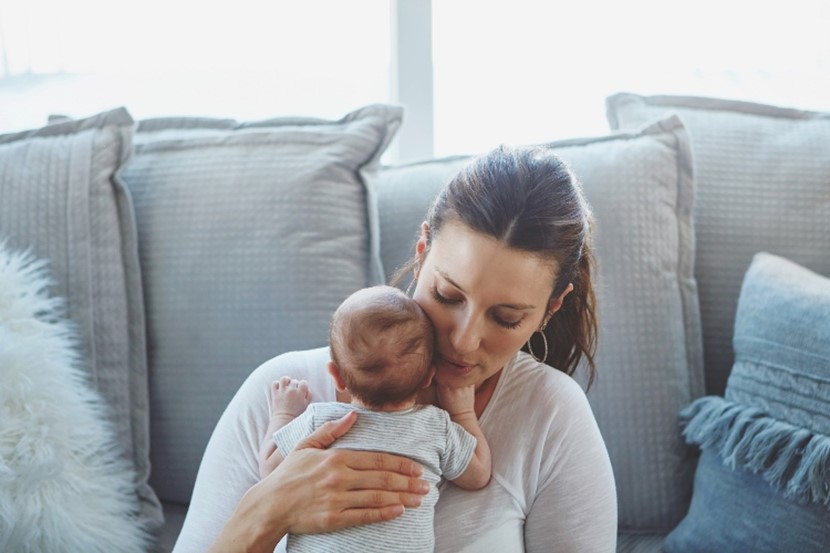
Pippa Henderson talks to Kristina Paterson about how she overcame perinatal depression, and how she’s now successfully helping others to do the same.
I just spent an hour talking to an expert on perinatal depression. You might think I’d be feeling kind of low right now, but the conversation was unexpectedly upbeat. Sure, there was talk of how depression can envelop you like an insidious fog, and raw confessions on how the combination of sleep deprivation and depression can rob you of such a precious time of life. But there were also stories of personal victories, of invaluable and transferable lessons learnt, things which left me with a strong sense of hope for present sufferers. Perinatal depression is an illness people tend to hide in dark corners and keep from public discussion. On the whole the topic may seem as stifling as a heavy blanket on a hot night, but when you learn how hundreds of New Zealand women are finding support and reclaiming their lives, and then you zoom in on the power of a simple kind word and a listening ear, it’s a lot easier to talk about, and the blanket doesn’t seem so smothering. You can shift your focus from its weight to the definitive holes where fresh light is shining in.
Kristina Paterson is the perfect candidate to unpack perinatal depression. Not only did she go through a long journey of suffering and recovery herself, but she also has a background in paediatric nursing, a masters in applied social work, and is now the founder and service manager of Mother’s Helpers, a not-for-profit organisation committed to detecting perinatal depression as early as possible, treating it holistically, and giving mothers all the support they need.
What is perinatal depression?
Before hearing Kristina’s story, I ask her to explain the term perinatal depression. Practitioners are now using this term because it covers depression during pregnancy as well as within the first twelve months after birth. “People are generally aware of postnatal depression, but often haven’t heard of antenatal depression, so the hope is that the term ‘perinatal’ will help people get used to the fact that depression and anxiety happen during pregnancy as well.” In fact, a recent Growing Up in New Zealand study of a diverse sample of around 5300 women showed there was actually a higher rate of depression/anxiety in women during pregnancy than following birth.
Kristina is a case in point. She suffered from undiagnosed anxiety throughout her pregnancy, so it was a very stressful time, both physically and emotionally. “My midwife described me as overly anxious, which made me feel like a burden. I did ask her to refer me to maternal mental health and she never did, in fact she never even screened me for depression or anxiety.” Unsurprisingly, Kristina ended up with really high blood pressure, which resulted in an induction, and ultimately a complicated and traumatic birth. She now knows her experience is in line with research that shows that, when you have antenatal depression or anxiety, you’re at higher risk for complications.
Kristina’s situation continued to deteriorate post-partum. Her anxiety was heightened by breastfeeding problems, and her depression intensified. “I’d been a paediatric nurse and a nanny, but it never occurred to me that I’d ever feel anxious being home alone with a baby. And yet it felt like the days stretched on and on forever. I’d ring my husband and just say ‘Please come home’. I knew it was irrational, but I didn’t know how to manage on my own. You’re just surviving, from hour to hour and day to day. You don’t think clearly, or reflect, you’re just thinking how you’re going to manage the next thing that’s in front of you.” Kristina says at this point she dug really deep, pulled all her energy together and simply took care of her son’s needs. But doing so took everything out of her, and she got to the point where her energy was so low she knew she couldn’t keep going. By then her son was nine months old and people were telling her to see a doctor. “It was unbearable”, she says, and I sense that even that word didn’t do the experience justice.
A difficult hurdle
Like many sufferers, Kristina feared going to the doctor, partly because she knew what they’d say. “I thought if I don’t get a diagnosis, then maybe I don’t have it. You have these weird irrational thoughts! Maybe it was the stigma around it, but I also really didn’t want to take medication.”
Kristina did go to the doctor, received medication, and started to feel better within two weeks. “It’s crazy! I’d spent 18 months feeling absolutely horrible. That’s why I think if I’d been screened, diagnosed and treated earlier, I would have had a very different experience. So I feel quite robbed from that – he’s my only child.”
A holistic approach
She didn’t know it then, but medication was just the beginning of Kristina’s recovery. A year later, when her medication didn’t work any more, she realised she needed a more holistic approach to her mental health. She began her own research, trying to understand how diet, exercise and talk therapy can help depression. “I learnt the early warning signs of depression, and what to do with those negative thoughts when they came into my head.” At this point I floated a theory I have about trains of thought being like literal trains – that we need to be really careful what thoughts we entertain, and read their destination before we even board them. Kristina was already all over this analogy, but was more realistic when applying it. “It’s common for women with depression to have negative thoughts, and they’re often already habitually on the ‘negative thought’ train – that’s their default. I teach them to notice that they’re on the train, and to get off at the next stop. Otherwise it will take you to a really dark place. And it’s usually a kind thought in response to that negative thought that helps us to get off at the next platform.”
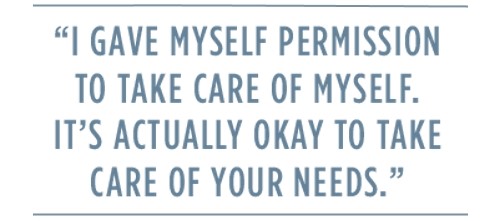
Kristina is keen to point out, however, that with perinatal depression, you’re often dealing with low self-esteem. “Research shows, if you’ve got low self-esteem, you’re a bit more at risk of developing depression, and so a lot of women, especially in this period of motherhood when we’re suddenly supposed to be martyrs, can get a bit like ‘I don’t deserve to have kind thoughts about myself right now. I’m not being a good enough mum … I don’t deserve someone to speak kindly to me, or to let myself off the hook.’” This is where Kristina emphasises the need for women to be realistic in their expectations in a time of healing, saying to themselves "It’s okay to ask for help and support, and to lower my expectations at the moment because I’m not very well, and I need to get better. And then when I’m better, I can be a better mum". Kristina encourages sufferers to extend themselves the same grace they’d extend to a friend. “You’d never tell your friend they’re lazy, you’d say something really encouraging, like ‘it looks like you’re doing the best you can, and you obviously love your kids'. And that’s the type of thing that we need to be saying to ourselves.” One of the most important tools she learned during recovery was simply to look after herself. “I gave myself permission to take care of myself. It’s actually okay to take care of your needs.”
Running with the torch
Kristina’s story has a happy ending: she got better – and stayed better – but knowing how much her perinatal depression had cost her, she desperately wanted to prevent other women from having to go through it.
“I wanted them to get help early on – not just be identified and diagnosed, but to be referred to something. Because I’d discovered there was really nowhere to be referred to. I didn’t meet the criteria of maternal mental health, because I wasn’t severely depressed, I was what they call moderately depressed. The only funded thing available to me was medication.”
Kristina launched Mother’s Helpers in 2010. It started out as peer support, but soon evolved as she wrote and developed a recovery programme that incorporates CBT (cognitive behavioural therapy), mindfulness, exercise and diet, identifying triggers, and how to manage anxiety. It’s a 10 week course, facilitated by trained counsellors, social workers and life coaches, which can take place in a group, or one on one, or online: mothershelpers.co.nz/pnd-recovery-course/.
The results have been impressive. They’ve found that, within 12 weeks, 65% of women have recovered and are symptom free, while 100% of attendees had their depressive symptoms drop by 50%. “That’s really important to me” says Kristina, “I’m passionate about reducing the impact that depression and anxiety have on families, and I don’t want to do something unless it gets results.”

Research sheds fresh light
If you look into the consequences of perinatal depression, it’s serious stuff. Not only are the outcomes for women awful, they’re really awful for children as well. But a recent observational study in Jama Psychiatry, involving a large sample of women, found that there was remarkably lower risk of long-term effects on children (in terms of behaviour, academic performance and mental illness) if the postnatal depression was short term (eg two months post-partum), compared to if it was prolonged. “So it’s not so much the depression that affects the child, it’s if the depression goes on and on” explains Kristina. “An early diagnosis, intervention and effective treatment of depression not only speeds up a woman’s recovery, but also prevents the effects on her children.”
“So we have the ability to prevent depression becoming generational?”, I ask, “To cut it off as a seed?”. “Yes!” replies Kristina, with the conviction in her voice that can only come from having already experienced the sweet taste of victory.
Kristina goes on to tell me about research released in the Journal of Behavioral Medicine in the United States this year which sheds more fresh light on maternal mental health. The study involved the testing of around 2400 women from the Community Child Health Network and showed that women with religious or spiritual affiliations are less likely to experience depressive symptoms throughout their first year post-partum. “This is a helpful reminder to perinatal practitioners like myself to discuss religion and spirituality, and the connections women have now, or have had in the past” says Kristina. “In Western culture we tend to exclude spirituality and religion. It’s a bit of a token question, ‘Do you have a religion?’. We don’t go into it much. But it’s interesting as it seems to have a protective quality for women.”
So, great things are happening. There are tried and true holistic treatments proving successful at re-igniting joy in people’s lives (even when things seem so dark you can’t even find the matches) and dealing with depression before it affects the next generation. And in addition to this, research is confirming there are ways to protect yourself at your most vulnerable; timeless ways of guarding your flame. No wonder Kristina is excited about sharing the good news. “Because I’ve gone through it myself, I’m really passionate about it.
I know how awful it is, and I know that women can get better. And it actually doesn’t have to take that long.”

OHbaby!: What would you say to a woman who is suffering from symptoms of antenatal or postnatal depression?
Kristina Paterson: There is absolutely no shame in saying "I’m not doing very well, I don’t think I’m coping too well at the moment" – there is no shame in that. It doesn’t matter if it ends up being anxiety or depression or not, just reach out for help. I always suggest Mother’s Helpers in the first instance because you know that you’re not going to fall through the cracks: mothershelpers.org.nz or 0800 002 717, if they want to talk. Mother’s Helpers will refer you to your GP and your midwife, and everyone else, as well as giving you help ourselves.
I’d also say always go to someone you trust. If you don’t feel comfortable talking about how you feel with your GP, they’re probably not the right GP for you. If they don’t respond in a way that is helpful, or they respond in a way that you feel shut down, or not taken seriously, then you have a right to go somewhere else. And you should know that, unless you are hospitalised against your will, no one can force you to take medication. Going to the GP is just having a conversation. She might prescribe you medication, or want to, but actually it’s your choice. It’s really good just to have a conversation about it and get their opinion. You don’t have to take it. It’s good to get that perspective because I don’t think avoiding the GP is the answer.
What I say to women in the middle of their depression is you’re not always going to feel like this. At the time you think this is it, because it feels like this every day, and it’s awful, but I say it is going to get better. The women I speak to always cry in that first session, because they feel so much release, finally being able to speak to someone, be honest about how they feel, and feel accepted and supported. And then, by the end of it, I’m saying this is what we’re going to do – addressing all the issues that they’re facing – and they have a sense of hope, that feeling of ‘oh, I can get better from this, there is actually a way forward and I recover’ – a real sense of hope that they haven’t had in a long time.
OHbaby!: What would you say to someone who is concerned about their friend or family member?
Kristina Paterson: Don’t be afraid to have a courageous conversation if you think someone might be experiencing anxiety or depression. Even if they get offended, don’t be afraid to say "I’m really worried for you. Can I help? Can we go and talk to someone? I’m not saying you’ve got depression or anxiety but why don’t we find out if everything is alright?". Because she’s in a fog and can’t see the wood for the trees, and she needs someone to do that for her. We expect that to be happening with midwives and GPs, that if there was something going on that someone would have picked it up, but actually we have a bit of a broken system at the moment. Just keep an eye on her. If you’re worried about something, have a chat with her and take her to see a professional. Or give Mother’s Helpers a call and have a chat.
|
ARE YOU AT RISK, OR SUFFERING SYMPTOMS?
Risk factors: If any of the following apply to you, you may be at risk of developing perinatal depression – but never fear! You can prevent it by catching it early.
Symptoms:
|

AS FEATURED IN ISSUE 43 OF OHbaby! MAGAZINE. CHECK OUT OTHER ARTICLES IN THIS ISSUE BELOW
